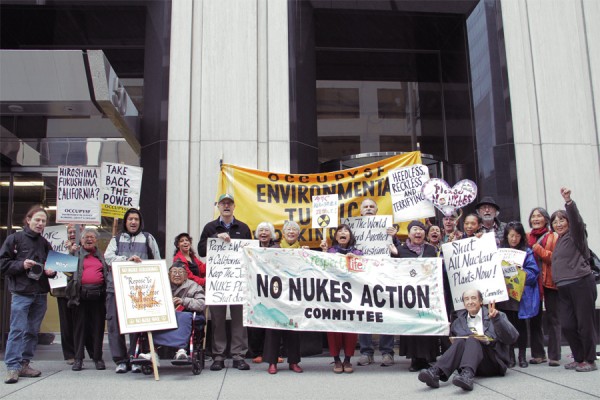Hearing that you would be visiting Japan from November 15 to 18, we are extremely worried that discussions are going to be held on developments in a Japan-India nuclear power cooperation agreement. We are strongly opposed to such an agreement.
Many people expressed their concern about a Japan-India nuclear power cooperation agreement at the time of your visit to Japan in 2010 as well. The reasons so many people opposed an agreement between our two countries at that time are as follows.
India, although it is a nuclear power, has joined neither the NPT nor the CTBT. Furthermore, in the amendment of the guidelines worked out in the Nuclear Suppliers Group permitting special measures for India, it did not commit itself to not carrying out nuclear testing in the future. It also has only allowed limited inspections by the IAEA to verify that it is not converting nuclear material produced in India for manufacture of nuclear weapons.
We protest in the strongest terms that now, two years later and with nothing done to address the above concerns, Japan and India are pushing ahead on a nuclear power agreement. We have experienced the Fukushima nuclear accident and are vividly confronted every day with the reality of what a catastrophic accident does to human life and to nature.
If you have come to Japan to promote a nuclear power agreement, don’t confine your discussions to the high and mighty in Tokyo, go to Hiroshima and Nagasaki and visit the peace museums there. Listen to the experiences of the hibakusha. And by all means go to Fukushima. Find out how people are trying to live with the 4 reactors emitting radioactive material around them; find out the horrendous conditions of radiation exposure that the thousands of workers trying to contain the accident must endure, and learn what has happened to the seas, the forests and the farm land. If you do that, we think that you will change your mind.
It is inexcusable for the Indian government, which has closed its eyes to the inhumanity of nuclear weapons and nuclear power, to crack down as it is on the people in various parts of India who are opposed to nuclear power. The massive repression of people opposing the Koodankulam nuclear power plants on September 9 was reported throughout the world. Ignoring the concerns of the people, concealing information, circumventing democratic procedures, and collusion between pro-nuclear organizations and nuclear oversight organizations are factors that contribute to nuclear accidents.
Nuclear power is clearly an industry in decline and it is incompatible with democracy. Japanese people who have experienced the Fukushima accident are strongly opposed to the export of nuclear power plants to other countries. We demand the following.
Do not engage in any talks whatsoever aimed at a Japan-India nuclear power cooperation agreement.
Immediately stop repressing people in India who are opposed to nuclear power plants.
Abandon operation of the Koodankulam nuclear power plants and immediately start decommissioning it.
Stop the import of nuclear plants from abroad and the construction of new facilities.
November 16, 2012
Prime Minister Noda Yoshihiko,
Indian prime minister Manmohan Singh will be in Japan from November 15 to 18 and will hold talks with you. We strongly demand that you engage in no talks of any sort directed toward a Japan-India nuclear power cooperation agreement.
India is a nuclear power that used heavy water reactors from Canada to manufacture nuclear weapons and which conducted nuclear tests. But it has joined neither the Nuclear Non-Proliferation Treaty nor the Comprehensive Nuclear Test Ban Treaty.
Furthermore, India has almost everything in the nuclear fuel cycle, from uranium mines to reprocessing facilities, but there are already numerous reports of damage to health and human rights violations in the areas around its uranium mines, nuclear power plants and other nuclear facilities.
No information whatsoever has been made public regarding construction of new nuclear power plants and the claims of the local residents have been totally ignored. As the tragedy that occurred in September at the Koodankulam nuclear power plants in the south coast, the situation is such that construction can go ahead only with the Indian government violently cracking down on residents opposed to the plant.
Furthermore, when India was made to agree to specific measures by the Nuclear Suppliers Group, India did not promise not to conduct nuclear weapons testing in the future, and it only agreed to limited International Atomic Energy Agency (IAEA) safeguards for preventing the conversion of nuclear material for use in weapons productions.
The Japanese government is hastily pursuing a nuclear power agreement with India because it does not want to miss out on business opportunities in India, one of the most lucrative nuclear power markets in the world. In 2010, when it became clear that it was pursuing talks toward a nuclear power agreement with India, the government was harshly criticized in Hiroshima, Nagasaki and all over Japan for “putting business before the prevention of nuclear proliferation.”
And now, in the midst of the ongoing catastrophe of the Fukushima nuclear power plant accident, we are calling on you in even stronger terms.
A nuclear power agreement with India means throwing to the winds our responsibilities as a country that has been the victim of atomic bombings. In no way can we permit moves to export nuclear power while radioactive material is even now still being emitted from the Fukushima nuclear power plant, workers at the plant are still being exposed to radiation, and countless other people are suffering from the accident. We demand that the Japanese government cease all efforts to pursue a nuclear power agreement with India and engage in no negotiations to that end.










